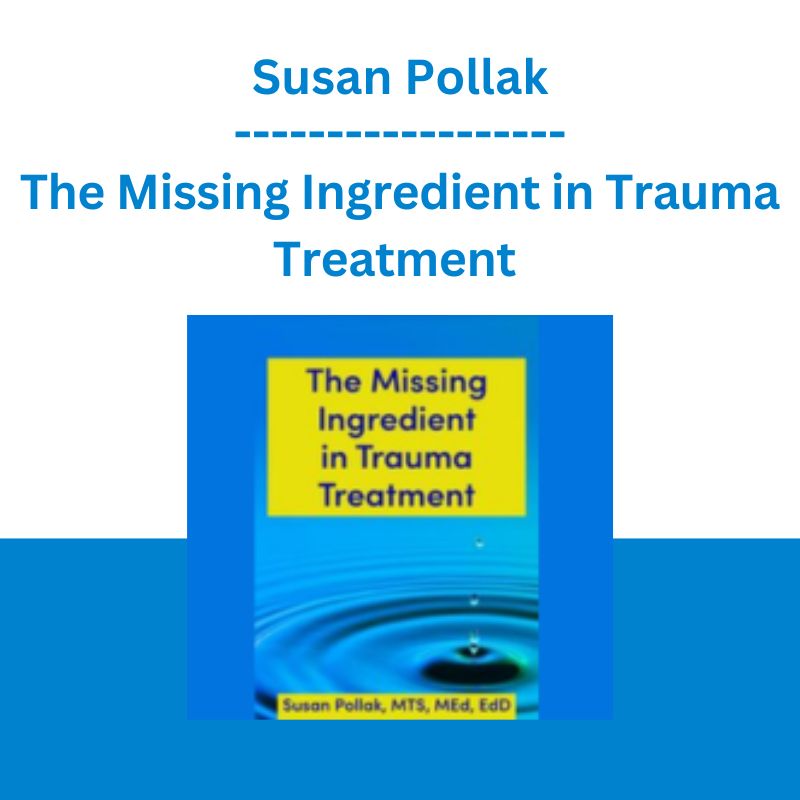*** Proof of Product ***
Exploring the Essential Features of “The Missing Ingredient in Trauma Treatment -Susan Pollak”
The deep shame and self-loathing that many of your traumatized clients experience can be difficult, if not impossible, to address. How can you get clients to shift their mind-set and begin healing when traditional therapies fall short? Susan Pollak, MTS, MEd, EdD, will give you practical skills for mindfulness meditation and self-compassion that will transform your clinical practice and help you guide clients through the healing process.
Speaker
Susan Pollak, MTS, MEd, EdD
Susan M. Pollak, MTS, MEd, Ed.D, is a faculty member in psychology at Harvard Medical School, Cambridge Health Alliance, where she has taught and supervised since the mid-1990s. She is the president of the Institute of Meditation and Psychotherapy from 2010-2020, is a founding member and senior advisor of Center for Mindfulness and Compassion, a psychologist in private clinical practice in Cambridge, Massachusetts and a Certified Teacher of the MSC program. Dr. Pollak co-taught Mindful Self-Compassion during its early development and she is co-author of Sitting Together: Essential Skills for Mindfulness-Based Psychotherapy, a contributing editor of Mindfulness and Psychotherapy, 2nd edition. Her newest book is Self-Compassion for Parents Her blog about Mindfulness and Compassion at Psychology Today is called “The Art of Now.”
Speaker Disclosures:
Financial: Dr. Susan Pollak maintains a private practice and is the cofounder and teacher at the Center for Mindfulness and Compassion at Cambridge Health Alliance. She is the conference director for Boston Institute for Psychotherapy. Dr. Pollak receives royalties as a published author. She receives a speaking honorarium and recording royalties from PESI, Inc. She has no relevant financial relationships with ineligible organizations.
Non-financial: Dr. Susan Pollak is a reviewer for Guilford Press and is a member of the American Psychological Association.
Objectives
- Assess the basic research on Self-Compassion and the Treatment of Trauma as it relates to clinical treatment.
- Formulate meditation practices for individual patients depending on their needs to improve client level of functioning.
- Evaluate various forms of Mindfulness meditation and know when to apply them in clinical settings.
Outline
What is Trauma? What is Self-Compassion?
- Defining self-compassion and trauma
- The misconceptions surrounding self-compassion and the research behind how it can be used to combat the effects of trauma
- The effects of self-compassion on behavior, motivation, resilience, and emotional regulation
How to Connect the Dots? The Value of Sequencing
- One size doesn’t fit all – assessing the needs of the client
The Three Mindfulness Meditation Skills
- Focused Attention – the practice of Just Listening and befriending the body using the practice of touch points
- Open Monitoring – bringing your clients into the present moment
- Loving-Kindness and Compassion Practice -transform the way your client relates to themselves and others, use compassion as a lifeline to remain resilient, and open your client up to loving themselves for who they are
- Utilizing Loving-Kindness and Compassion for the Clinician
- Review clinical illustrations of these concepts in action
Target Audience
- Counselors
- Educators
- Marriage and Family Therapists
- Nurses
- Psychologists
- Social Workers
- Other Mental Health Professions
Please see the full list of alternative group-buy courses available here: https://lunacourse.com/shop/










 Sovereign Man Confidential - Renunciation Video
Sovereign Man Confidential - Renunciation Video  Emanuele Bonanni - My Trading Way
Emanuele Bonanni - My Trading Way  Simpler Trading - Bruce Marshall - The Options Defense Course
Simpler Trading - Bruce Marshall - The Options Defense Course  The Daily Traders – Exclusive Trading Mentorship Group
The Daily Traders – Exclusive Trading Mentorship Group  Crypto Dan - The Crypto Investing Blueprint To Financial Freedom By 2025
Crypto Dan - The Crypto Investing Blueprint To Financial Freedom By 2025  Julie Stoian & Cathy Olson - Launch Gorgeous - Funnel Gorgeous Bundle
Julie Stoian & Cathy Olson - Launch Gorgeous - Funnel Gorgeous Bundle  Greg Loehr - Advanced Option Trading With Broken Wing Butterflies
Greg Loehr - Advanced Option Trading With Broken Wing Butterflies  Gary Kraftsow - Dissolve the Knot of the Heart & Connect to the Divine With Tantric Laya Yoga - The Shift Network
Gary Kraftsow - Dissolve the Knot of the Heart & Connect to the Divine With Tantric Laya Yoga - The Shift Network  Team NFT Money - Ultimate NFT Playbook
Team NFT Money - Ultimate NFT Playbook  Money Miracle - George Angell - Use Other Peoples Money To Make You Rich
Money Miracle - George Angell - Use Other Peoples Money To Make You Rich  Forexmentor - Recurring Forex Patterns
Forexmentor - Recurring Forex Patterns  Matthew Kratter - Trader University
Matthew Kratter - Trader University